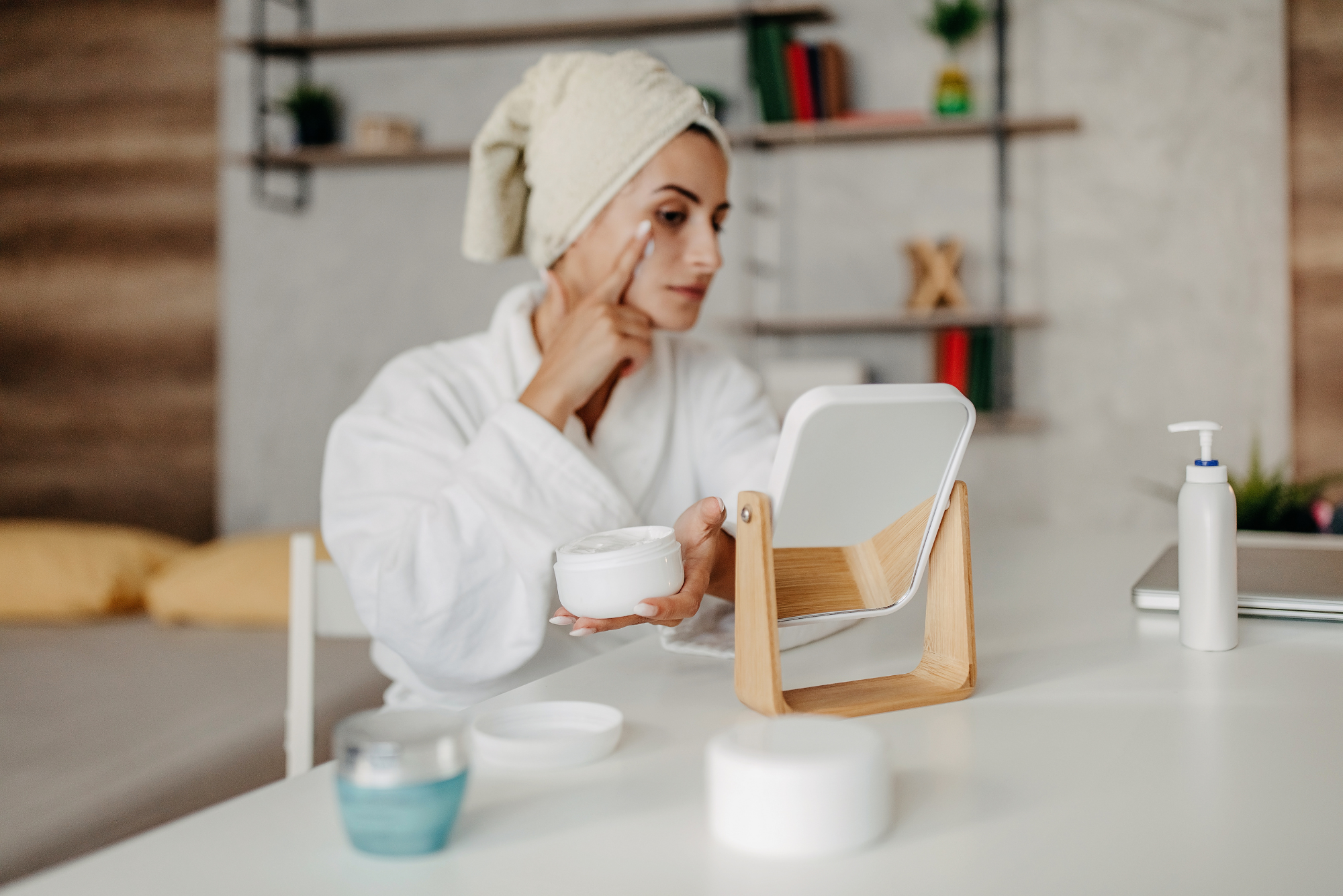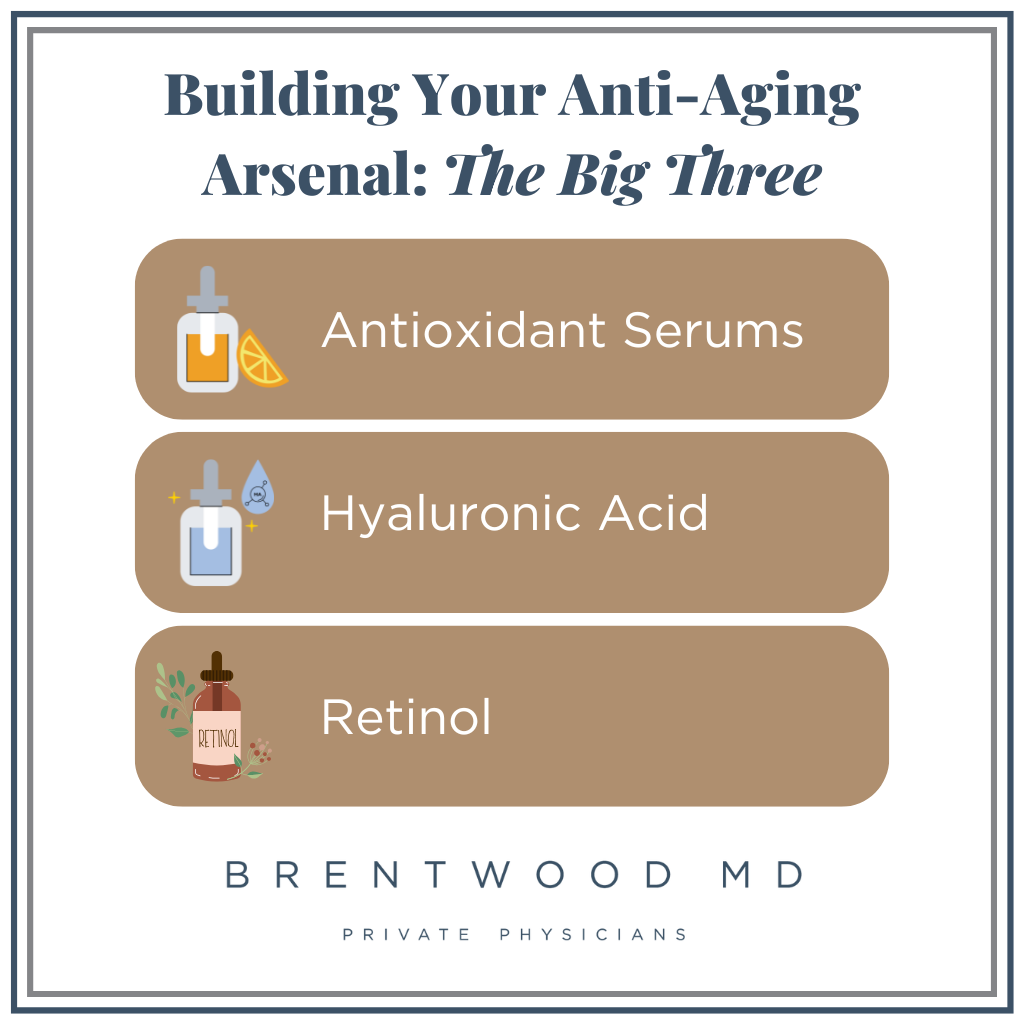Download file | Play in new window | |
As we age, our skin begins to reflect more than just our years. It often tells a story of our lifestyle, sun exposure, and even internal imbalances.
At Brentwood MD, we often hear from members who want to know how to care for their skin as they get older. But they want more than just a list of creams; they want to understand what actually works, what’s worth their time and money, and what aligns with a more comprehensive view of health.
I sat down with Dr. Brooke Eastham, a respected dermatologist at Nashville Skin, to get her take. With a background that includes a residency at Harvard Medical School and board certification from the American Academy of Dermatology, Dr. Eastham has been helping patients with medical and cosmetic dermatology for over a decade.
After discussing skin cancer prevention, our talk turned to skin aging and what we can do about it. I appreciated both Dr. Eastham’s depth of knowledge and her ability to cut through the noise to simplify skincare in a way that truly empowers patients.
Let’s unpack her advice.
Start Simple: Screen the Sun
Ask any dermatologist about aging skin, and you’ll likely hear the same starting point: Protect your skin from the sun.
“Sun protection is number one,” Dr. Eastham emphasizes. “If you invest in all the lasers and all the cosmeceuticals but don’t protect yourself from the sun, you’re basically negating everything.” This isn’t some folksy dermatologist wisdom; it’s backed by decades of research showing that UV damage is a primary driver of premature skin aging.
Fortunately, the empowering truth is that much of this damage is preventable simply by making sun protection a daily habit. Dr. Eastham recommends using a mineral-based sunscreen of SPF 50 or higher.
Building Your Anti-Aging Arsenal: The Big Three
Sunscreen is well and good, but many people want to know what else they can do for their skin — preferably without filling their medicine cabinet to overflowing.
“You’ve got to keep it simple,” Dr. Eastham emphasizes. “If you have 12 bottles of serums on the counter, but you don’t use them, they’re not going to be effective.” She recommends aiming for a skincare routine that’s streamlined enough for consistency and focusing on one or more of these three key product types:
Antioxidant Serums
“Vitamin C, vitamin E, ferulic acid — those are antioxidants that can help protect against DNA damage from the environment, and also give a little sun protection,” Dr. Eastham shares.
These powerful antioxidants are both gentle and effective, fighting inflammation, brightening the complexion, and even stimulating collagen production, all without irritation.
Hyaluronic Acid
As we age, our skin naturally loses its ability to retain moisture. Think of hyaluronic acid as a moisture magnet, pulling water to your skin’s surface to create that plump, smooth appearance we associate with youth.
Retinol
Tretinoin, commonly known as Retin-A, is a retinol with decades of research supporting its ability to reduce fine lines, improve skin texture, and even out pigmentation. But Dr. Eastham is careful to note that retinol isn’t for everyone.
Whether you incorporate retinol depends on an honest assessment of your lifestyle and your skin’s sensitivity. For instance, sun sensitivity increases with retinol use, making consistent sun protection and perhaps less sun exposure critical.
Accessible Options: Quality Skincare at the Drugstore
One of the most refreshing aspects of my conversation with Dr. Eastham was her enthusiasm for accessible skincare options. While her practice offers clinical-grade cosmetics, including their own line of skincare products, she wants patients to know that they have effective drugstore options as well.
In particular, she recommends two top brands:
CeraVe
“In general, CeraVe is a very gentle product line,” she says. “They’re geared for patients with sensitive skin.” The brand has expanded significantly in recent years, offering everything from vitamin C serums to retinol products at a fraction of the cost of high-end alternatives.
La Roche-Posay
La Roche-Posay, a French brand, offers similar quality and gentleness. “I try their products myself, so I feel like I can vet them,” Dr. Eastham notes. Her staff members also use these products, giving her practice real-world experience with their effectiveness and tolerability.
When and How to Level Up: Lasers, Microneedling, and More
Once patients have a solid routine, many begin exploring aesthetic procedures to target deeper concerns like pigmentation, texture, or fine lines.
Broadband Light (BBL)
As one of the most impactful entry points to this next level of treatment, BBL addresses sunspots, broken capillaries, and uneven pigmentation, which are often the most visible signs of sun damage. “With one treatment, you can get rid of reds and browns,” Dr. Eastham explains.
Many patients treat their face, neck, and chest often in a single session, turning back the clock with a sweeping improvement in skin tone and clarity.
Microneedling
Microneedling is another accessible option, especially for those new to cosmetic dermatology. “We’ll often recommend that to someone that’s never done anything, and they kind of want to tiptoe in,” Dr. Eastham says.
This minimally invasive treatment is ideal for addressing pores, acne scars, and early signs of aging by stimulating collagen production with controlled micro-injuries to the skin. It’s very well tolerated, typically involves a series of three sessions, and has no significant downtime.
Fractionated Lasers
More aggressive fractionated lasers can address deeper concerns like lines, acne scars, and significant texture issues. However, these treatments require more downtime. “You’re going to have a couple of days of looking bad before you look good,” Dr. Eastham advises.
Larger lasers do exist, but they can require weeks of recovery. “We don’t use this a lot in our practice because most of our patients are busy,” Dr. Eastham says. Instead, the practice focuses on treatments that fit busy lifestyles, recognizing that most people can’t (or don’t want to) take weeks off for recovery.
The Filler Conversation: Moderation Is Key
With injectables like fillers, Dr. Eastham emphasizes that moderation is key. While fillers can play a big role in cosmetic dermatology, she sees too many patients who’ve been oversold on volume.
“When done right, they can do a phenomenal job,” she shares. “But overfilling is bad.”
The social media influence sometimes creates unrealistic expectations in patients. “Some patients will want larger volume in their lips or cheeks, and they just go too far,” she says. The pressure to achieve dramatic results quickly can lead to outcomes that patients later regret.
Dr. Eastham’s practice takes an extremely conservative approach and cautions that it’s easy to be oversold on syringe benefits.
The Skincare Trap: When Less Is More
Perhaps the most concerning trend Dr. Eastham observes is the explosion of skincare products targeting increasingly younger demographics. She shared the story of a 16-year-old patient who came in with about 16 different skincare products — a situation that’s becoming increasingly common.
“I had to back her down and say, let’s pick three. Let’s simplify,” she recalls. Young skin typically needs gentle cleansing, basic moisturizing, and sun protection, not the complex anti-aging regimens being marketed to teenagers.
The Holistic Picture: How Your Lifestyle Shows on Your Skin
Here at Brentwood MD, we approach every individual with a focus on the foundations of health: nutrition, movement, sleep, and more. I was struck by how directly these same areas affect dermatologic health.
Regarding acne treatment, for example, while medications are a valid treatment option, “sometimes there’s more going on,” Dr. Eastham shares.
For acne, she identifies stress and diet as two common culprits. Or sometimes a deeper issue, like PCOS or metabolic syndrome, is causing breakouts. “We can try to treat with all the medicines, but we’ve got to fix the root cause as well,” Dr. Eastham says.
To get to the bottom of skin issues, she takes the extra time to ask patients about their diet, sleep, stress, and exercise. She finds that patients who come in with sudden, stubborn acne, or new or worsening eczema, psoriasis, or autoimmune issues often have one or more environmental or lifestyle factors influencing their condition.
“We can fix things from a skin standpoint,” she says. “But until we fix [the underlying issue], we’re putting a Band-Aid on this.” In such cases, dietary changes, a new exercise routine, reduced stress, or prioritized sleep often make an enormous impact on skin health.
Nutrition, Gut Health, and Your Skin
Dr. Eastham recalls how dermatology has shifted from dismissing dietary influences to embracing them as crucial factors in skin health.
Her go-to recommendation today is the Mediterranean diet — rich in vegetables, lean proteins, and healthy fats — as a solid, anti-inflammatory foundation for healthy skin. “The longer the shelf life, the shorter your life,” she shares, recalling one of her favorite phrases about diet and the importance of choosing fresh, minimally processed foods.
She also notes a growing interest in gut health and its relation to skin: “The gut is a major part of our immune system. What we put in is going to manifest in all organ systems. Your skin is your largest organ.”
From acne to psoriasis, increasing evidence indicates that our microbiome plays a role. While we still have more to learn, the early signals are clear: Nutrition and gut health are powerful levers for long-term skin vitality.
What’s Next: Innovations in Dermatology
As we wrapped up our conversation, I asked Dr. Eastham what she’s most excited about in her field.
Her answer? Targeted biologic therapies, particularly for autoimmune skin conditions like lupus and psoriasis. “Historically, we just had broad-spectrum immunosuppressive agents that shut our immune system down,” she shares. “Now we have drugs that target the root inflammatory mediator.” This means fewer side effects and better outcomes for patients with difficult-to-treat conditions.
Such therapies are already helping patients who had previously run out of options. It’s a promising glimpse into the future of personalized skin care.
Your Skin Is a Window: Don’t Ignore It
Our skin reflects not only our age but also our internal balance. From hormones to inflammation to lifestyle, skin can be one of the first places these dynamics show up.
If there’s one message from this conversation that stuck with me, it’s this: Take care of the basics. Protect your skin, simplify your routine, and don’t underestimate the impact of sleep, nutrition, and stress.
If you’re interested in learning more about skincare or have a particular skin issue you’d like to address, Nashville Skin now has seven locations in the Nashville area. Whether you want to investigate underlying causes or explore cosmetic treatments, the dermatologists at Nashville Skin — like Dr. Eastham — are available to help you put those pieces together and find the right path to your healthiest skin.

Dr. Wright joined Brentwood MD in 2022 as the model allows him to spend more time connecting with patients and build a foundation of exceptional care. He is a Nashville native and completed his family medicine residency at the University of Tennessee Health Science Center, where he also served as Chief Resident. He believes that your health deserves a prominent position on your priority list, and would be honored to serve you and your family.









